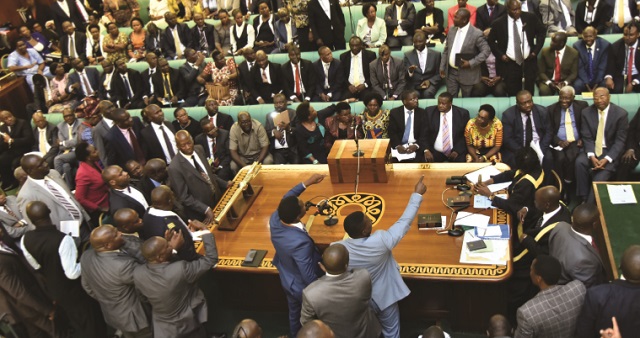
Mbale, Uganda | THE INDEPENDENT | The government legal team led by the Deputy Attorney General Mwesigwa Rukutana has been probed at-length over emerging information that Parliament’s decision to entrench the Presidential term limits is not reflected in the Constitutional Amendment Act 2017.
Parliament in December last year passed the Constitution (Amendment) (No. 2) Bill, 2017. The bill among others lifted the presidential age limits and restored the Presidential terms limits.
The Parliament during the committee stage also adopted a motion by Budadiri West MP, Nathan Nandala Mafabi urging that the term limits should not only be restored but also entrenched.
By agreeing to the Mafabi motion by majority vote, Parliament had in effect moved the article about the restored term limits and included among entrenched articles of the constitution under article 260. Article 260 details articles of the constitution whose amendment requires the holding a referendum.
The constitutional court hearing in Mbale was plunged into a lengthy exchange between the judges and the Attorney General’s legal team after it emerged that the entrenchment of the Presidential term limits is missing from the Act assented to by the President.
The Court has been probing into the matter since Tuesday when Clerk to Parliament, Jane Kibirige was cross-examined on the fact that the Nandala Mafabi amendment seemed to have not been extracted from the official record of Parliament-the Hansard for inclusion in the amended Constitution.
The Acting Director of Civil Litigation, Christine Kaahwa seemed to have opened a can of worms for the Attorney General’s legal team when she submitted that article 260 of the constitution was not amended.
Deputy Chief Justice, Alphonse Owiny-Dollo followed by other judges seemed to disagree with Kaahwa’s submission leading to a lengthy probe.
Justice Owiny-Dollo said his side was relying on the record tendered by the Attorney General, not the petitioners. The Clerk to Parliament on cross-examination on an affidavit she swore in defense of the amendment, admitted that the speaker had put a question in relation to the Nandala Mafabi motion and the House decided on that.
The question at the hearing was whether the Constitutional Amendment Act 2017 as it is, reflects the decision of Parliament.
Kaahwa insisted that the claim that article 260 was amended would create an absurdity because the final Act does not show that article 260 of the Constitution was amended.
Justice Kenneth Kakuru overruled Kaahwa’s submission saying submissions from the respondents led by Deputy Attorney General Mwesigwa Rukutana was causing confusion.
The Deputy Attorney General who is leading the respondent’s side later admitted that the Nandala motion had been adopted by Parliament. Rukutana’s admission attracted another round of questions from the judges. Justice Remmy shot first followed by Justice Owiny-Dollo.
Rukutana later said that the said article could be inserted after a referendum is held.
The government according to submission to the court is planning to hold a referendum in line with the Constitution Amendment Act 2017.
*****
URN
 The Independent Uganda: You get the Truth we Pay the Price
The Independent Uganda: You get the Truth we Pay the Price



